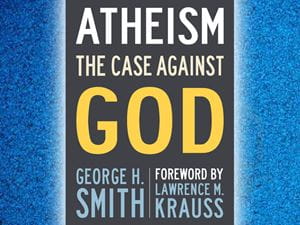
More than two decades before Richard Dawkin’s called belief in God a “delusion,” George H. Smith elucidated the rational critique of religion in his essential book Atheism: The Case Against God. This updated version of his classic sets out to demolish what Smith considers the most widespread and destructive of all the myths devised by human beings—the concept of a supreme being.
Chapter 1: The Scope of Atheism
. . . even in our hours of most complete and serenest intellectual detachment we cannot escape facing the question whether God can be eliminated from either the natural or the moral world without converting both into an incoherent nightmare.
This image of a godless world is only one among many. Atheism has become so enshrouded with myths and misconceptions that many supposed critiques of atheism are notable for their complete irrelevancy. Some religious critics prefer to attack the unpopular ideas associated with atheism rather than face the challenge of atheism directly. Indeed, it is not uncommon to find entire books with the expressed intent of demolishing atheism, but which fail to discuss such basic issues as why one should believe in a god at all. These books are content to identify atheism with specific personalities (such as Nietzsche, Marx, Camus and Sartre) and, by criticizing the views of these individuals, the religionist author fancies himself to have destroyed atheism. In most cases, however, the critic has not even discussed atheism.
Presenting the atheistic point of view is a difficult, frustrating endeavor. The atheist must penetrate the barrier of fear and suspicion that confronts him, and he must convince the listener that atheism represents, not a degeneration, but a step forward. This often requires the atheist to take a defensive position to explain why atheism does not lead to disastrous consequences. The atheist is expected to answer a barrage of questions, of which the following are typical.
Without god, what is left of morality? Without god, what purpose is there in man’s life? If we do not believe in god, how can we be certain of anything? If god does not exist, whom can we turn to in a time of crisis? If there is no afterlife, who will reward virtue and punish injustice? Without god, how can we resist the onslaught of atheistic communism? If god does not exist, what becomes of the worth and dignity of each person? Without god, how can man achieve happiness?
These and similar questions reflect an intimate connection between religion and values in the minds of many people. As a result, the question of god’s existence becomes more than a simple philosophical problem—and atheism, since it is interpreted as an attack on these values, assumes a significance far beyond its actual meaning. Defenses of religion are frequently saturated with emotional outbursts, and the atheist finds himself morally condemned, diagnosed as a confused, unhappy man, and threatened with a variety of future punishments. Meanwhile, the atheist’s frustration increases as he discovers that his arguments for atheism are futile, that the average believer—who was persuaded to believe for emotional, not intellectual, reasons— is impervious to arguments against the existence of a supernatural being, regardless of how meticulous and carefully reasoned these arguments may be. There is too much at stake: if the choice must be made between the comfort of religion and the truth of atheism, many people will sacrifice the latter without hesitation. From their perspective, there is much more to the issue of god’s existence than whether he exists or not.
Where does this leave the atheist? Must he offer atheism as an alternative way of life to religion, complete with its own set of values? Is atheism a substitute for religion? Can atheism fulfill the moral and emotional needs of man? Must the atheist defend himself against every accusation of immorality and pessimism? Does atheism offer any positive values? These questions are not as complex as they may appear. Atheism is a straightforward, easily definable position, and it is a simple task to outline what atheism can and cannot accomplish. In order to understand the scope of atheism, however, we must remove the wall of myths surrounding it—with the hope that the fears and prejudices against atheism will collapse as well. To accomplish this goal, we must determine what atheism is and what atheism is not.

